Drama Writing Awards 2017
The Kenneth Branagh New Drama Writing Award winner 2017 is...
'Fade Out' by writer Lyndsey Honour Directed by Linda Miller
"It's an amazing feeling to have someone respond to your work in a positive way, and to win on top of that feels a bit surreal - especially when the quality of the other plays was so high. Congratulations to the other finalists and a big thank you to everyone involved for all the hard work and effort that went into the productions - and huge thanks to Windsor Fringe for supporting new writers with this award!” Lyndsey Honour
The photo shows Lyndsey Honour accepting the award from the Fringe Chairperson; Karen Darville.
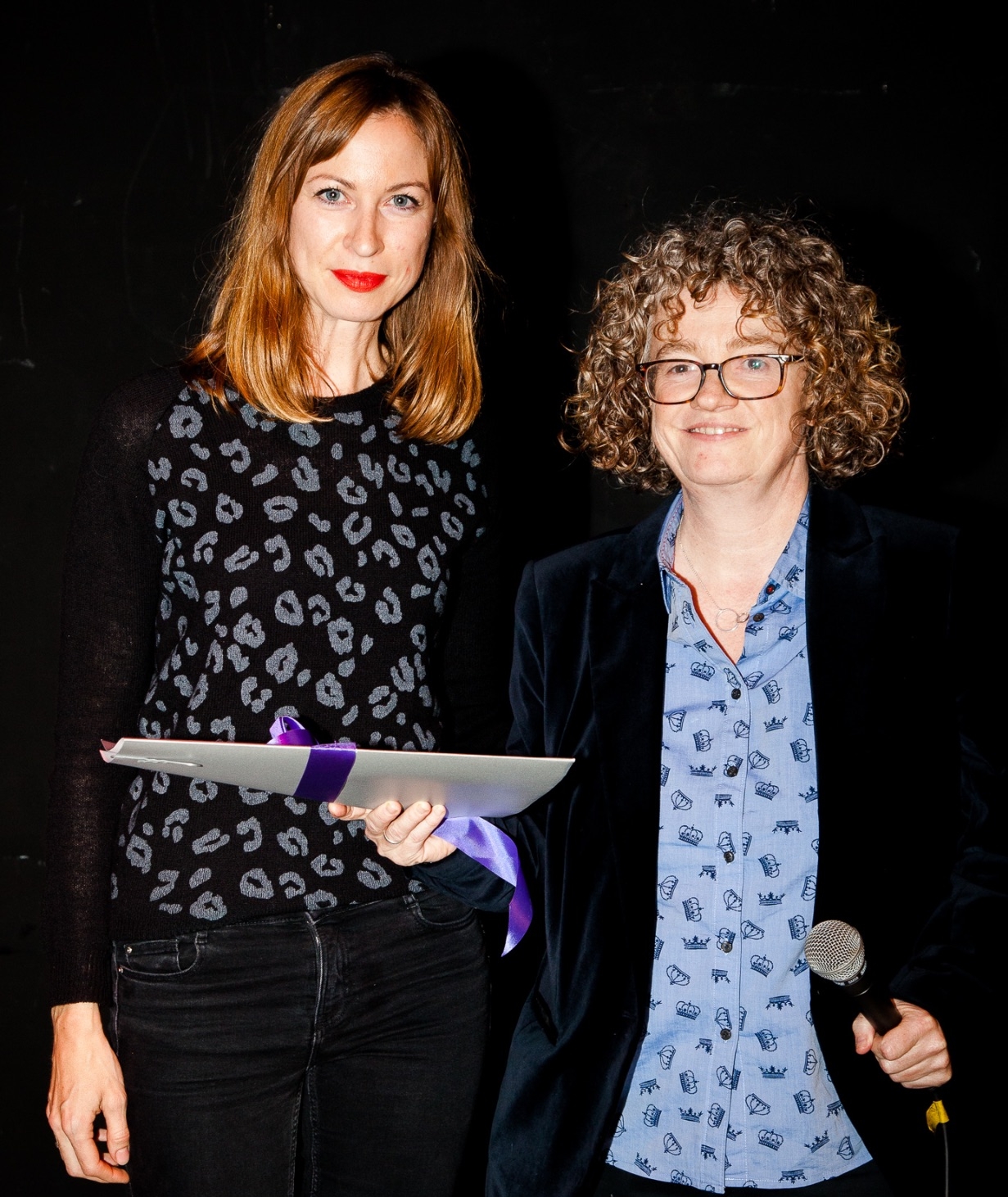
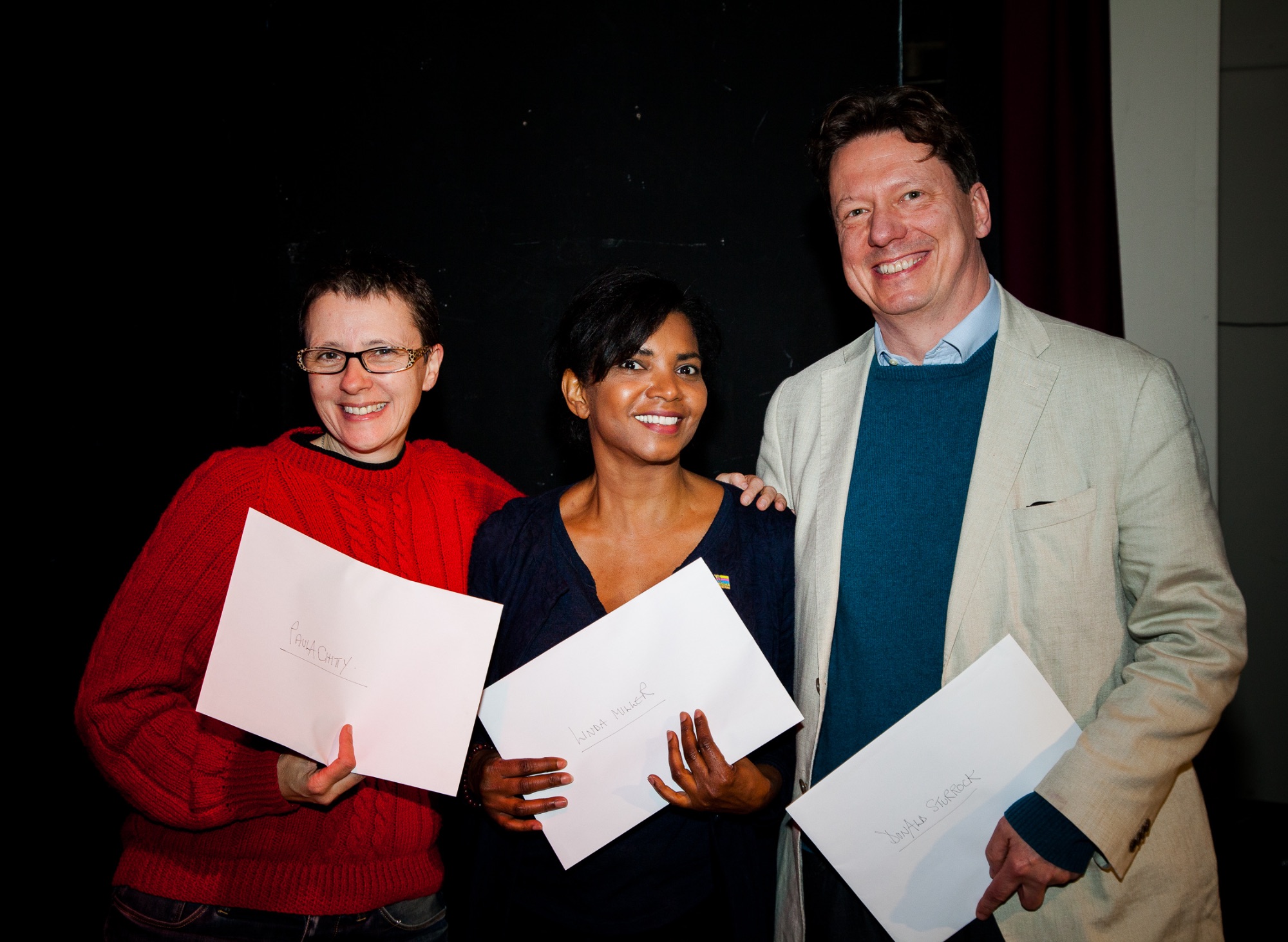
THREE DIRECTORS: from L: Paula Chitty, Linda Miller, Donald Sturrock
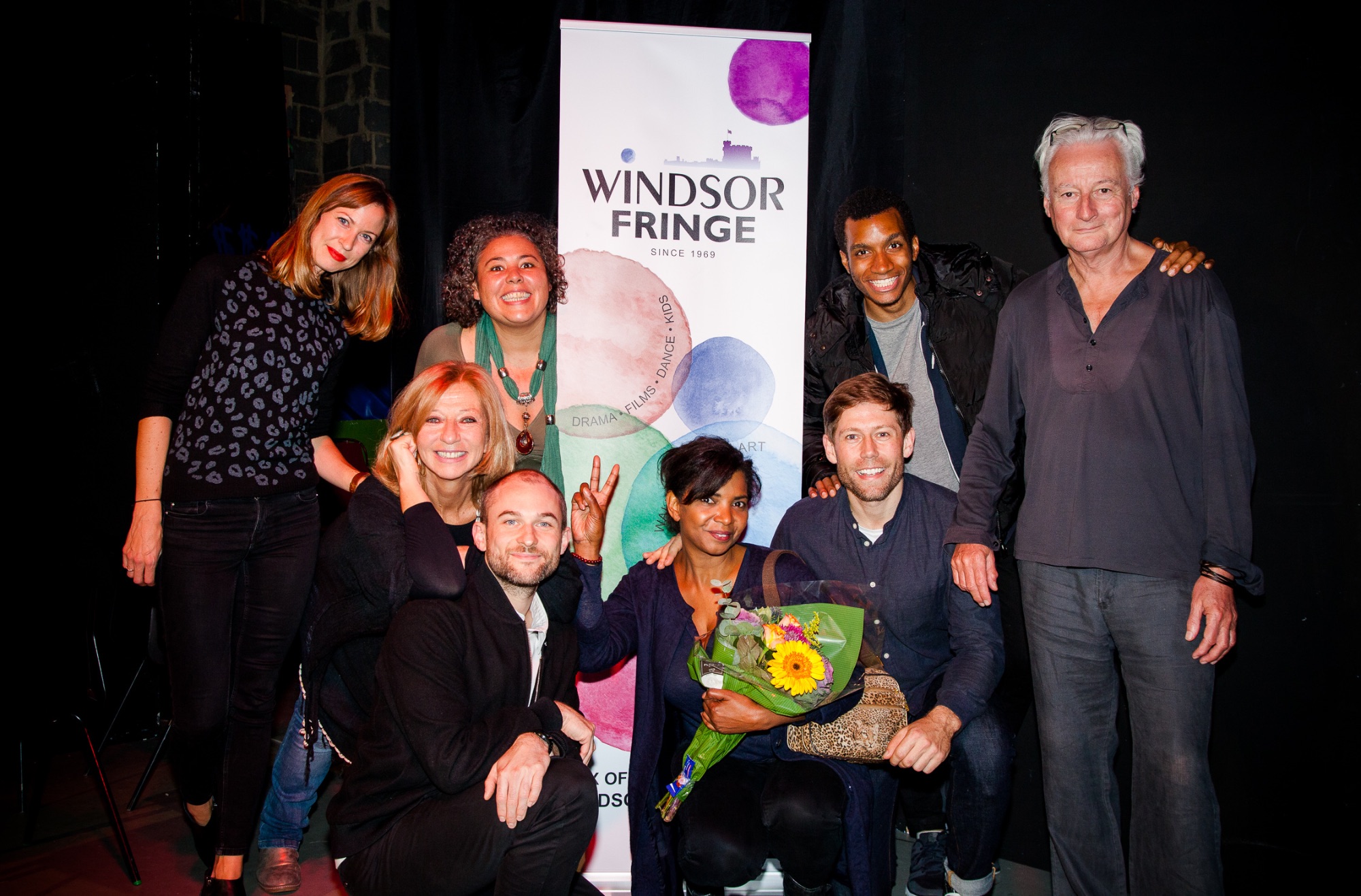
CAST OF FADE-OUT: From L: Lyndsey Honour (writer) Alice Langrish, Michelle Fine, Andrew David, Linda Miller (director) Adam Seigel, Joshua Boyd-Campbell & Michael Jayes
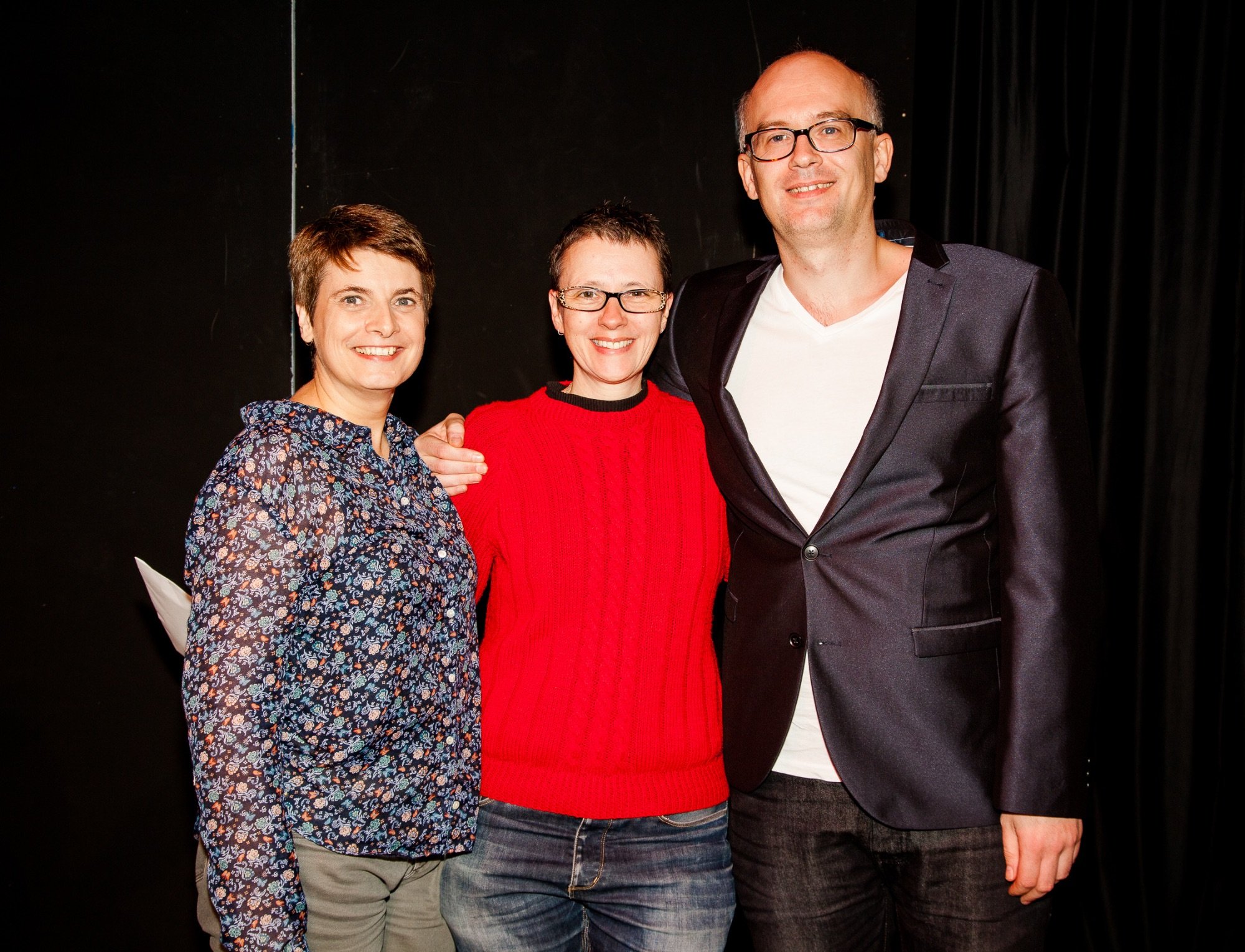
CAST OF HOMETIME: From L: Elizabeth George, Palua Chitty ( director) & David Hendon (writer)
"I was very proud to reach the final of The Kenneth Branagh Award for the second year running and delighted with the audience response to my play". David Hendon
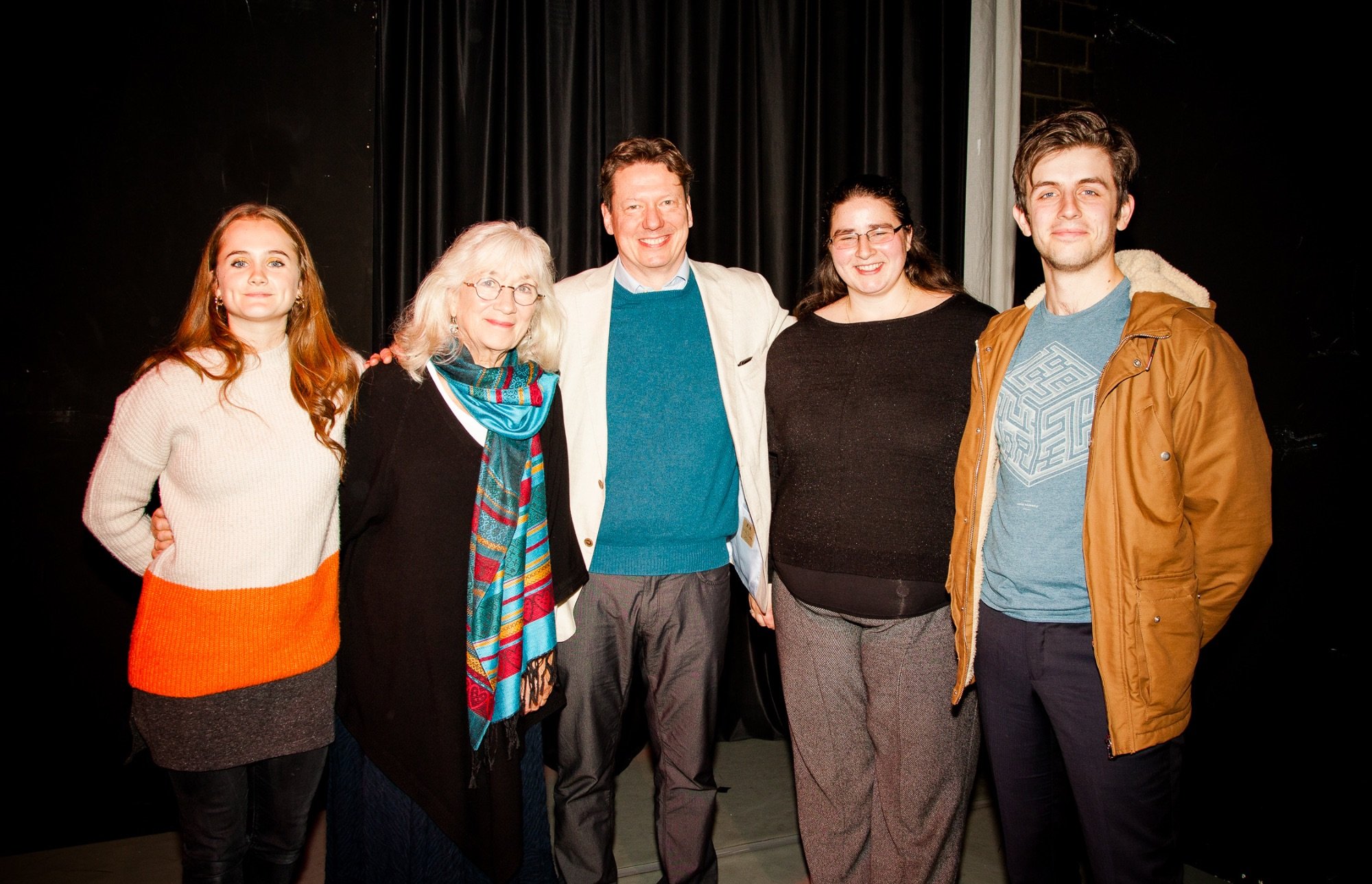
CAST OF CLARA AT NOON: From L: Jenny Egleton, Illona Linthwaite, Donald Sturrock (director) Wendy Dickinson (writer) & Will de Renzy-Martin
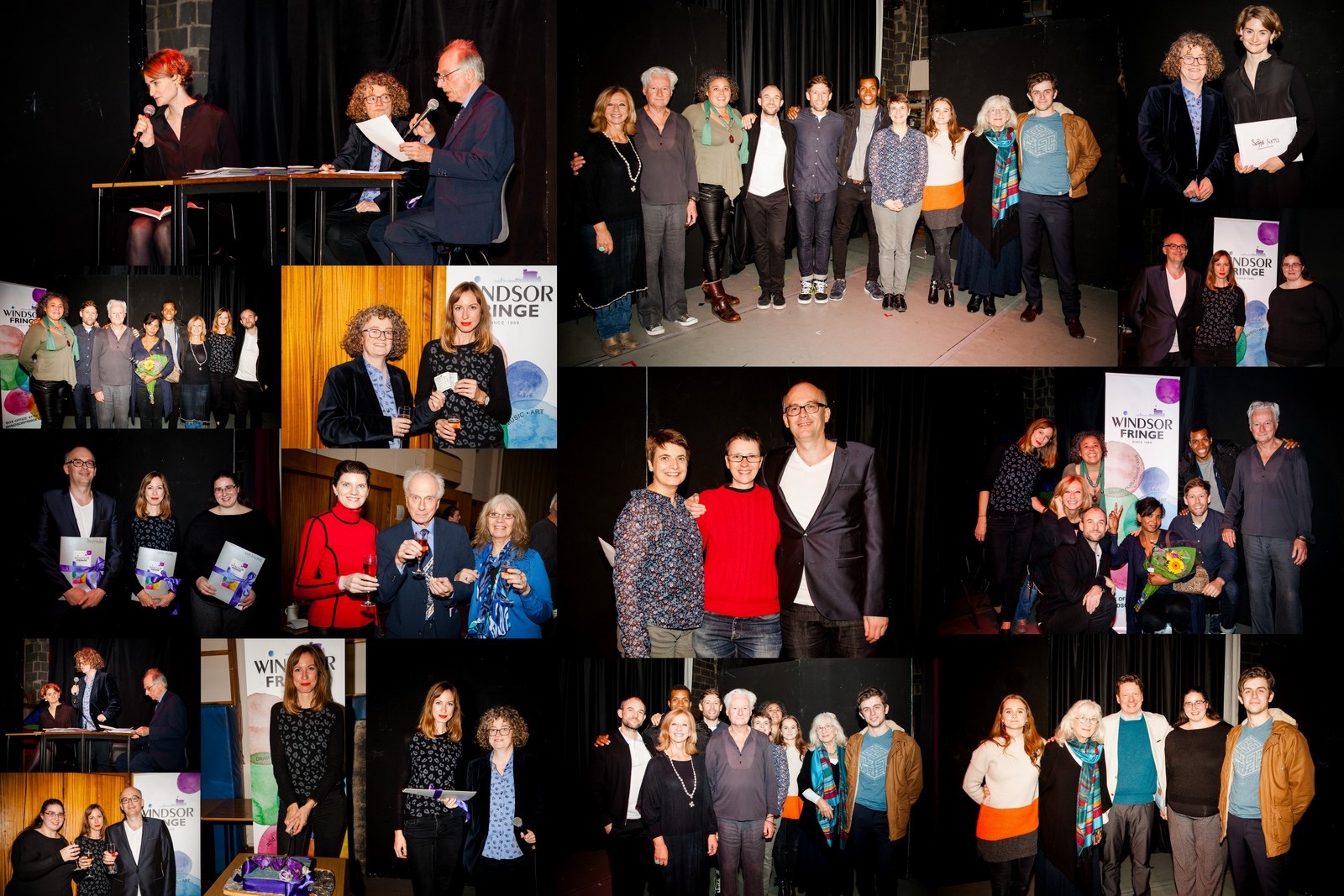
Final Night of the Performances:
We had a sell out night with the hall packed & everyone enthusiastic and keen to hear the announcement of the winner. The winning writer was Lyndsey Honour with her play FADE-OUT, directed by Linda Miller. Lyndsey's day job as a TV and film publicist has her working with talented writers and she is in awe of great story telling. She has been entering scripts to our award for a few years & in 2016 was in the final short list of nine.
Ann Trewartha
Judges Comments on the Three Wining Plays
Script CLARA AT NOON
Compelling and tragic, CLARA AT NOON is a simple and yet powerful mini-drama that grips from beginning to end. I loved particularly the sense of theatrical drama and action-shift from the condensed (Clara seated and dignified) to the very large (being helpless on the floor as Jason pushes a clock onto her). I loved the clever use of time as a motif here. Also, I enjoyed the clashing of characters and how the challenges and divides between generations were revealed in stark focus. Excellent too was the political undercurrent running throughout that felt pertinent and real when manifested through these human characters.
Rob Cowen
Clara at Noon. This clever play combines political comment with brilliant theatrical stakes and live action. It has an absolutely believable and relatable central character that audiences won’t fail to identify with, and at the same time it provides a complex comment on the problems facing different generations. It never felt predictable. The image of Clara immobilised on the floor whilst Jason pushes the grandfather clock over has remained with me, and is rich in the questions it raises about the mutual responsibilities of the old and young towards each other.
Sophie Ivatts
Script HOMETIME
Loved this play’s simplicity and honesty. This is a devastatingly heartfelt and touching story that unravels brilliantly to a crushing conclusion and its strength comes from the fact that it compels you to read/watch even when you have this sense of dread mounting. The key to this is a character whose voice is real and believable but engaging too, enough to keep your attention throughout. HOMETIME has that and, at the same time, there are wider themes touched on and teased out here: the making of a life and its often strange twists and turns before it is so easily snuffed out. A heartbreaking play that leaves you with a shifted sense of the fragility of life – something that takes a lot of skill.
Rob Cowen
This is a very compelling, moving story, with a refreshingly simple, earnest voice. I never guessed where it was going, which made the horror of the denouement all the more visceral.
It really captures an anxiety of our age about random acts of extreme violence, and our powerlessness to beat chance. But its theme of grief for a child resonates beyond the here and now. I also really liked it for putting a rather normal, unglamorous woman, (who I often feel are in rather short supply in drama) at its heart, and making her the shaper of the story, rather than just the accessory to it. Totally believable and heartfelt.
Sophie Ivatts
Script FADE OUT
An excellent short play, FADE OUT is a brief window into an interesting and relevant world that is intelligently and artistically rendered. What really struck me here was the confidence and believability of the narrative exchanges; the characters were not only believable but felt fully formed and entirely real.
The structure also worked wonderfully, allowing as it did the exploration of self and success, ambition and reality, and parents and their children, all wrapped up in the revival of a famous singer’s career. The play builds the characterisation exactly as it should, revealing complexities, challenging concepts of success and artistry as it delves with a fresh eye into the interplay between a mother and son dealing with the fallout of fame.
Rob Cowen
This play was striking for its characters, whose distinctive voices jump off the page and feel instantly real. The dialogue is pacy, believable and, crucially, moves the action on. It is also a really interesting and unusual story- I am particularly grabbed by the mother-son relationship being so toxic- it doesn’t feel like anything I’ve seen explored before.
A highly accomplished, subtle, and intelligent piece, gently offering intriguing questions about what it means to be a mother and an artist, ageing, the cultural shifts of the last 50 years, grief, and our relationship with the past.
Sophie Ivatts
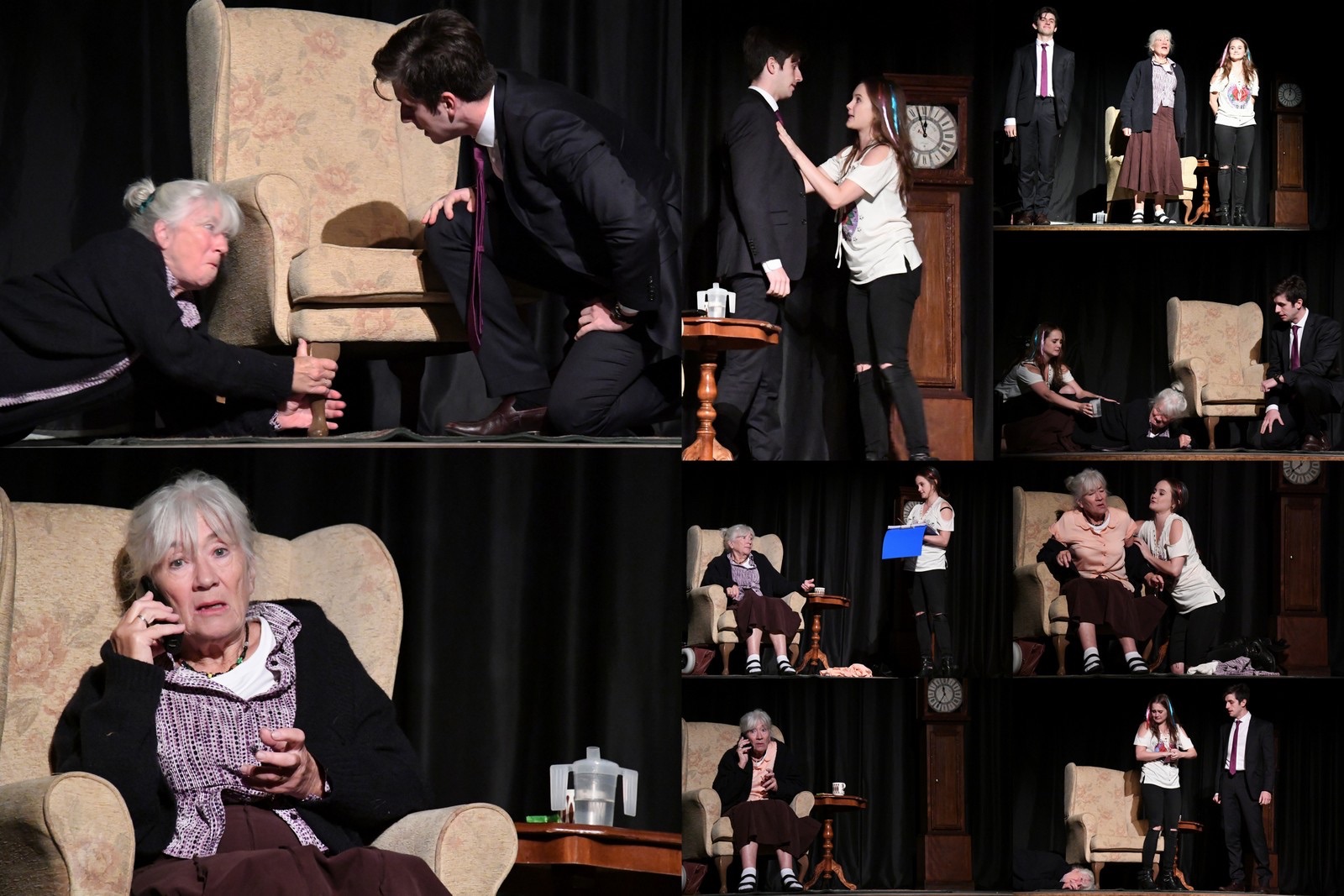
"Clara at Noon" - Rehearsal Pictures
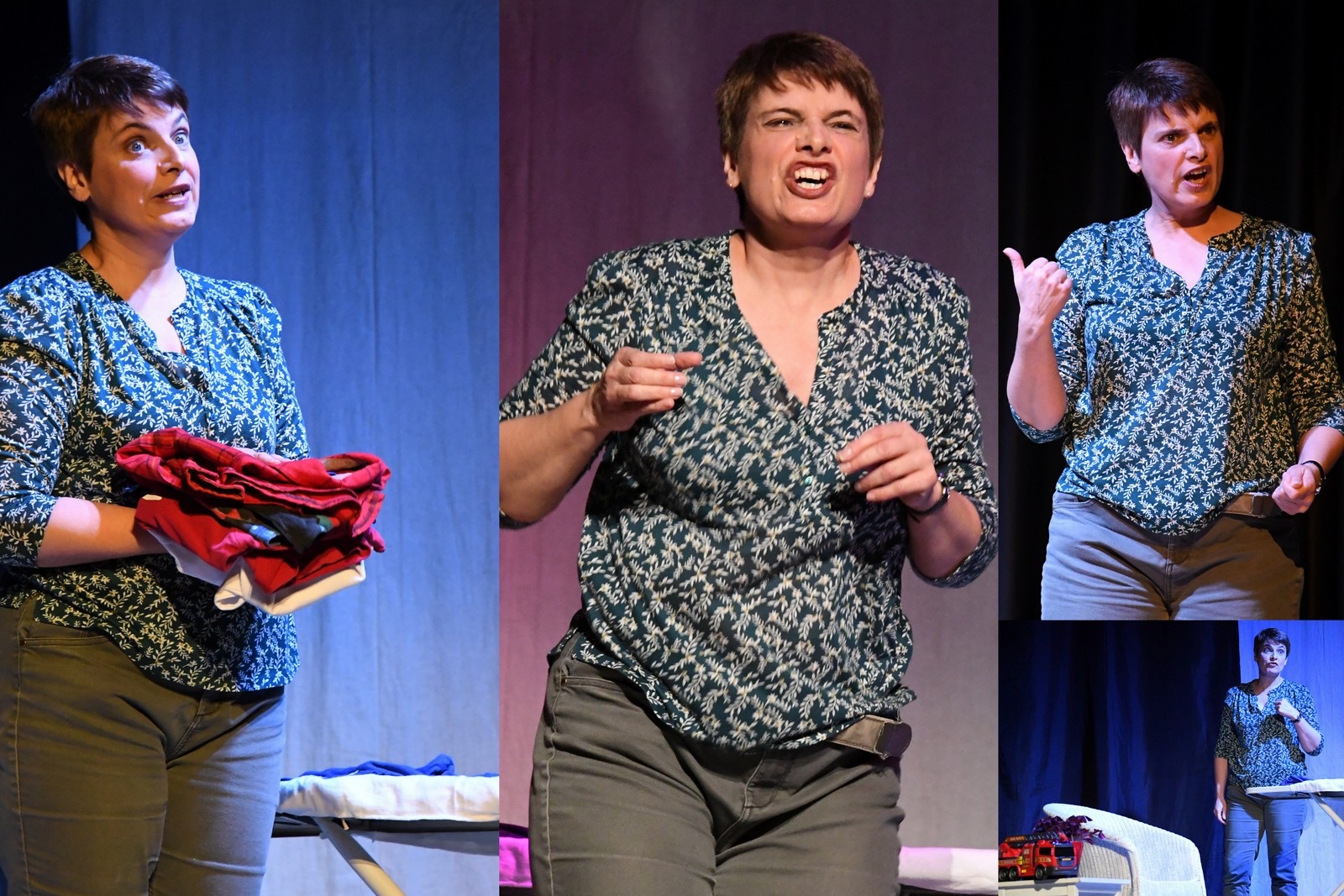
"Home Time" - Rehearsal Pictures
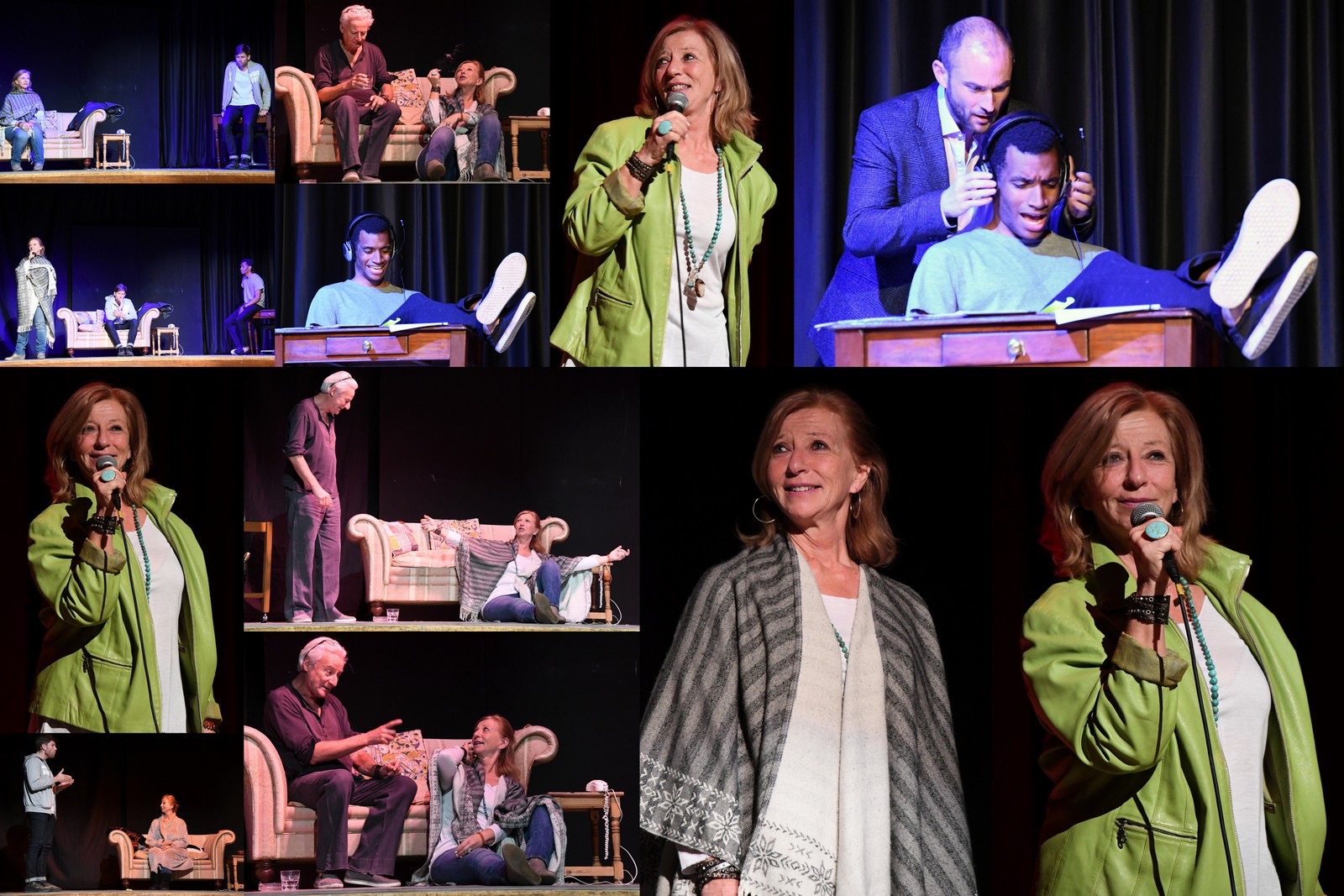
"Fade Out" - Rehearsal Pictures
REVIEW: Lyndsey Honour Wins Branagh New Writing Award Sunday, October 8, 2017 by Greg Stewart
Review From theatreweekly.com
https://theatreweekly.com/lyndsey-honour-wins-branagh-new-writing-award/
Last night (Saturday 7th October) I attended the presentation of The 14th Windsor Fringe Kenneth Branagh Award for New Drama Writing. It is one of my favourite events of the theatrical year; partly because you get to see completely new works being presented on stage for the first time, but also because of the passion of the team behind the award, who want to promote new writing and nurture new talent.
This year 257 scripts were entered, from seventeen different countries. They are all read by a team of forty readers, who do not know who the author is, and a shortlist of ten is drawn-up. Three winners are announced and these three plays are performed for three nights at Windsor Fringe, before an overall winner is announced on the final night. Although the award is based solely on the writing, it is thrilling for the audience to see the work brought to life in a production.
This year, the prize was won by Lyndsey Honour for Fade-Out, her first produced play. Following a retired rock icon who needs to make a come-back, it examines the central character’s relationship with her son, publicist and close friend.
David Hendon found himself in the top three for the second year running, and looked a shoe-in to win for the emotional Home Time, the story of a single mother who loses her son in the most horrific of circumstances. Hendon’s writing is first-class in this surprising, shocking and heart-wrenching monologue.
Wendy Dickinson’s Clara at Noon was a highly accomplished piece of writing which highlighted societal issues and brought an ethical dilemma to the fore. Moreover, it teased the audience with unusual pacing which gave a whole new dimension to the performance.
The prize is awarded based entirely on the writing, but for those lucky enough to witness the performances there was definitely star quality on stage. Illona Linthwaite gave a wonderful interpretation of Clara in Clara at Noon, which worked well with her co-stars Jennie Eggleton and Will de Renzy-Martin, the latter demonstrating potential in a relatively small role. Elizabeth George in Home Time and Michelle Fine in Fade-Out also captured the audiences hearts
Comments from judges, Sophie Ivatts and Rob Cowan, were read out before Lyndsey Honour was announced as the winner. While everyone who saw the performances will have had their own favourites, no-one could deny Honour was a worthy winner and all the writers deserved their place in the top three.
The Kenneth Branagh Award for New Drama Writing, and Windsor Fringe as its custodian, provides new writers with a unique opportunity to have their work judged anonymously. For the final three it’s an incredible way of showcasing their work, long may this important catalyst for new work continue.
by Greg Stewart
Greg is an award-winning writer with a huge passion for theatre. He has appeared on stage, as well as having directed several plays in his native Scotland. Greg is the founder and editor of Theatre Weekly.
REVIEW: Clara at Noon, Fade-Out, Home Time Wendy Dickinson, Lyndsey Honour, David Hendon
society/company: Windsor Fringe Kenneth Branagh Awards (directory) performance date: 07 Oct 2017 venue: Brigidine School Windsor
Reviewer: Frank Kaye (Sardines review)
http://www.sardinesmagazine.co.uk
A REVIEW OF THE PERFORMANCE OF THE THREE FINALIST PLAYS FOR KENNETH BRANAGH AWARDS FOR NEW DRAMA WRITING, 2017 AT THE WINDSOR FRINGE
“We are proud to present a performance of the three finalists for the Kenneth Branagh Awards for New Drama Writing. The winner has already been selected and will be revealed at the end of the evening.” What an intriguing set up for reviewing the performances – would it match the judges’ perception of the writing?
The Fringe website notes that Windsor is unique in having full performances of the three finalist plays, rather than the more usual rehearsed readings. It says that this is to allow the writers to work with a director and cast to bring the play to life. One doesn’t know how much engagement the writers had but one presumes that the major directorial choices were at least consulted with the playwright. As I have not read the scripts I can only comment on what I saw.
A key constraint for all the performances was the venue, a large school assembly hall with a proscenium arch stage. Certainly, two of the plays were intimate in their engagement with the audience – so the setting was not ideal. A further constraint was presumably time and money though none of the plays were particularly demanding in this respect, notwithstanding the constraints of rehearsal time.
The first play, Clara at Noon, written by Wendy Dickinson, instantly engages the audience as the main protagonist, an old widow living on her own, slowly edges her way on stage with the help of a wheeled Zimmer frame – easier to push but can run away from you! She says nothing for quite a while and then says something like, “Oh well, survived for another day!” We are drawn into the familiar but embarrassing existence to which we consign our old people. Illona Linthwaite perfectly portrays the restricted capabilities of the old and infirm. She misses a phone call because she is too slow and takes another phone call from her daughter where she has exactly the dutiful exchange with which many of us are familiar. Ultimately, she falls asleep in her winged chair – comfortable but symbolic as she could just as easily be in a care home sleeping in a circle of chairs with other tenants of God’s waiting room.
We become aware of a grandfather clock up stage left and especially of the insistent ticking which serves to bring the audience “into the moment” despite nothing happening. A key is heard in the front door and Simone, the carer arrives. The drama of the play is signalled as she puts something in the grandfather clock before waking Clara with a loud “Hello, Clara!” causing her to spill her tea on her blouse. Simone, played with appropriate sensitivity by Jenny Eggleton, says, “Don’t worry, I’ll go and get you a clean blouse. Keep it away from your skin so you don’t scald.” I immediately felt we were going to be exposed to the appalling indignity of old people stripped down to their underwear by strangers. Sadly, we weren’t as Illona was wearing a tee shirt underneath and the play began to lose its hold on me. The remainder of this section is well done including some amusing tick boxing of the obligatory form filling.
After the carer leaves Clara gets a phone call cancelling her reason for being out when the carer and her boyfriend return and she suddenly needs the loo with the result that she falls and the Zimmer frame rolls away from her. We are drawn into the moment again both by Clara’s laboured dragging herself across the floor and, after she passes out, by the incessant clock ticking as she waits interminably for help. For me the fine judgement of how long to wait was just exceeded as my attention began to wander.
The final section when the carer and boyfriend arrive does not quite work for me. The three-way tension between the Clara’s insistence on calling the police, the boyfriend wanting to leave her and Simone caught in the middle works okay but comments by the judges indicate that they saw more here than the audience perceived on the night. We do not get the social commentary about the attitude of the young to the older generations. We certainly do not get “The image of Clara immobilised on the ?oor whilst Jason pushes the grandfather clock over has remained with me…” cited by one of the judges. Jason is played perfectly well by Will de Renzy-Martin but the director decided not to push the clock over for practical reasons denying Will the structure of this last section to make his real impact. Overall the direction by Donald Sturrock was fine but for me flawed by a couple of crucial decisions.
The second play, Hometime written by David Hendon and directed by Paula Chitty, was a triumph. Someone sat behind me said that we should have stood to applaud and I agree. Elizabeth George, who plays the sole protagonist, Jennifer, trained in both acting and mime and this is the perfect single hander for an actor with those skills. It is impossible to untangle the roles of writer, director and actor in achieving the outcome but that is what great theatre is all about.
We are taken on a journey from the joy of a mother at home with a small child, through the mixed blessing of her meeting the father who only lasts a year to the final inevitable tragedy. The structure of the play is crucial, starting and ending in the present but going back in time for the middle sections. The structure is overlaid with beautifully written dialogue and then the genius element is the miming of the story. After about ten minutes I began to find the mime a bit distracting but the shift to a night club with appropriate music which ended with a perfectly timed crash and then the ultimate recognition that all this activity was the way that Jennifer coped with the loss resolved my concerns.
The beauty of the writing, acting and direction was the way that we were given pictures of the many characters through the vivid descriptions. Ffion and her father stick in my mind especially when the father says he will “send a car” to pick up his seven-year old from the scene of a traumatic tragedy.
Modern theatre often foregrounds objects, giving them equal status with actors. This play not only has some very simple objects – a red fire-engine, an ironing board, children’s’ clothes but also some vibrant images inserted into our imagination such the green fire-engine drawn by the little boy – which begins and ends the play. We also saw Jennifer laying out clothes on the floor as representations of her child and her schoolfriends. This last would work so much better in a studio theatre with raked seating.
So, to the last play. Fade-out, by Lyndsey Honour directed by Linda Miller. Frankly, for me it didn’t work which was all the more disappointing as it won the Kenneth Branagh writing prize. The performance opens strongly with Alice Langrish as an aggressive TV reporter theatrically facing the audience as she is trying to gain access through the fourth wall. The main protagonist, Ingrid, played by Michelle Fine, is on the inside being challenged to let the reporter in by her manager, Jamie played by Joshua Boyd-Campbell.
The plot concerns the need for Ingrid to make a comeback as a singer after a quarter of a century out of the limelight. This would appear to be driven by financial concerns and she does not relish the attentions she will receive. The play is structured with a number of scenes that feature a different interaction with Ingrid. If it is to work we need to be carried on the emotional journey with Ingrid so that the play does not fragment. Sadly, it did because the balance of each scene was carried by the supporting actors.
Adam Seigel is particularly strong as the emotionally scarred son and he is given two bites of the cherry in two scenes. Michael Jayes gives a convincing performance to bring out the nostalgia element, although the interaction with Michelle Fine felt somewhat insecure on the night. Andrew David is a strong presence as the impresario as the come-back performance approaches.
Michelle Fine’s strongest moment is when she picks up the microphone to sing about half way through. Beyond this though she is outshone by the other actors. Her performance felt rather fragile which may have been deliberate to portray Ingrid’s lack of confidence but it meant that the taut narrative thread of the play that may have been seen on the page by the judges, Sophie Ivatt and Rob Cowen, was somewhat slack and ineffective.
In performance I felt that Clara at Noon and Homecoming delivered on their status as one of three finalists out of more than two hundred and fifty entries. The plays are well structured, well directed and very well acted with particular note going to Illona Linthwaite and Elizabeth George. Fade-out may work in a different context but I have my reservations regarding its over complicated structure for a short thirty-minute play.
Frank Kaye
9 October 2017
10th October
Windsor Fringe comes to dramatic end with 'Fade Out' play
Francis Batt Reporter
THE Windsor Fringe has come to a dramatic end - thanks to an ageing female rock star and her desperate attempts at a comeback after 26 years.
The struggling lady's battles with the complexities of her personal relationships formed the basis of Lyndsey Honour's play Fade Out which won the Kenneth Branagh Award for new drama writing on the final night of the Fringe on Saturday.
Miss Honour is a TV and film publicist in her day job, has worked with a number of talented writers and says she is in awe of great storytelling.
She is also a script reader and writes whenever she gets the chance. This was the first play that she has written that has been performed and it beat 256 other entries from 17 countries.
She said: "It's an amazing feeling to have someone respond to your work in a positive way and to win on top of that feels a bit surreal - especially when the quality of the other plays was so high."
The cast of Fade Out was lead by Zimbabwe born Michelle Fine, whose acting credits range from Les Misérables to The Bill.
The other two dramas in the final three that were performed at Brigidine School in Kings Road on Thursday, Friday and Saturday nights were Clara at Noon, written by Wendy Dickenson and Hometime by David Hendon.
Clara at Noon was a drama about the abuse of an elderly widow by her carer. While Hometime by David Hendon – a previous Kenneth Branagh Drama Awards finalist – was a topical play about the impact of a school shooting on a bereaved mother.
The Kenneth Branagh Awards closed a successful 2017 Fringe festival and chair of the Fringe Karen Darville said: "We are delighted that so many people have supported a wide range of activities across the Fringe showing that we offer choice and entertainment for all sectors of the community. As we build up to our 50th anniversary in a few years time we continue to expand the selection of activities we offer and look forward to a strong Fringe in 2018”.
'Fade Out' by Lyndsey Honour - Actor's Biographies
Michelle Fine
Michelle was born in Zimbabwe and attended Drama School in Cape Town University. She came to the Royal Exchange Manchester to act in a S. African play ‘Separate Development’ and stayed to pursue her acting career. Credits:- Biograph Girl - Phoenix Theatre, Les Misérables - The Palace Theatre, Assassins- Donmar Warehouse Theatre, Invade My Privacy - Shaftesbury Theatre, Innocent Erendira - Donmar Warehouse Theatre. Fringe:: Invade My Privacy, I’m Just Wilde About Oscar - Kings Head, Eight To the Bar - Hampstead New End, Invade My Privacy, Caught By The Tail- Riverside Theatre, Cinderella, Shooting Ducks - Stratford East and Edinburgh Festival.Repertory Theatre around UK and (Malta, Japan, South Africa and USA Film and TV :The Bill, SWET Awards, King of Chaos (BBC), Photographing Fairies, Out of the Ashes (HOB)
Adam Seigel
Adam trained at The Drama Studio London, after working in the City as a broker.
Film Credits inc: Face the Camera and Smile, Into Me See (an entry in the Earls Court Shorts Festival ) At Dawn ( the multi nominated WWI drama short) & Love Type D.
Theatre Credits inc: Face The Camera and Smile (The Kings Head) SAVE ( Hen & Chickens) Brief Encounter (The Pleasance) Three Sisters ( (The Arts Theatre) City Boys ( Southwark Playhouse) and The Gossip ( The Soho Theatre)
Alice Langrish
Alice trained at MMU.
Since graduating she has led a varied & colourful life, culminating with studying as a midwife. She has been in Coronation Street, where her special effect for sneezing was used for comedy effect and she has just taken part in the Rappaport festival
Andrew David
Andrew studied English & Drama at Bristol University and trained at The Drama Centre London. Feature Films inc: The Rozart, starring Dougray Scott. Theatre Credits inc: Performing across Spain, Shanghai & the UK at: The Trafalgar Studios, The Leicester Square Theatre, the O2 Arena, Stratford’s Shakespeare Festival & The Bush Theatre
Twitter: @ andydavidactor
Joshua Boyd-Campbell
Joshua is a young rising star from London, having worked on various high profile projects to date across theatre, film and television.His training includes The Identity School Of Acting & Anna Fiorentina Theatre & film School
Theatre credits include:
How To Hold Your Breath (Royal Court), Dunsinane (The Royal Shakespeare Company), Secret Cinema – Star Wars: The Empire Strikes Back, Boy X (Arc Theatre) and The WishMaker (Haringey Shed/Bernie Grants Arts Centre).
TV credits inc:: CRIMS (Prod. By BBC Three),1980’s: The decade that made us (Prod. By National Geographic/Nutopia Ltd).
Film: AUX (Evolutionary Films), Gummy Man Rage (Dan Kokotajlo/Virgin Media Shorts) ’High Hopes’ (Prod by. Palerima Pictures; Cannes 2012: Short corner selected & Rain dance 2012 Film Festival Selected).
Michael Jayes
Michael trained at LAMDA and has worked in theatres all over the UK and abroad. London appearances include: Box and Cox (Spice of Life), The Clandestine Marriage (Albery), Les Femmes Savantes (Hampstead), Five Years (Bunker Festival), Fuenteovejuna (Royal National Theatre), Hold On Hortense (Croydon Warehouse), The Man Tree (ICA), Newsrevue (Gate), Noises Off (Richmond), Old King Cole (Southwark Playhouse), The Promise (New End), Riverman (Tabard), The Underpants (Old Red Lion) and Two Halves of Shandy (Soho Poly/King’s Head). Since playing Michael Starling in the BBC’s Royal Flying Corps drama Wings, Michael has also worked extensively in film/TV including ‘Allo ‘Allo, The Basil Brush Show, Bergerac, The Bill, The Bright Side, Call Red, Chariots of Fire, Chucklevision, The Cleopatras, The Colonel’s Lady, The Debt,The File on Jill Hatch, Flying Colours, The Gentle Touch, Head Over Heels, Hot Money, The Hutton Enquiry, Love in a Cold Climate, Love Story, Macready and Daughter, Making News, Minder, Murder in Mind, Partners in Crime, Pig in the Middle, Potter, Princess Daisy , Remington Steele, Take Three Women, Tandoori Nights, The Two Mrs Grenvilles and Tickets for the Titanic. Michael has played Windsor Theatre Royal (in Donkey’s Years amongst others) and is delighted to be part of Windsor Festival 2017.
Our Three Winners
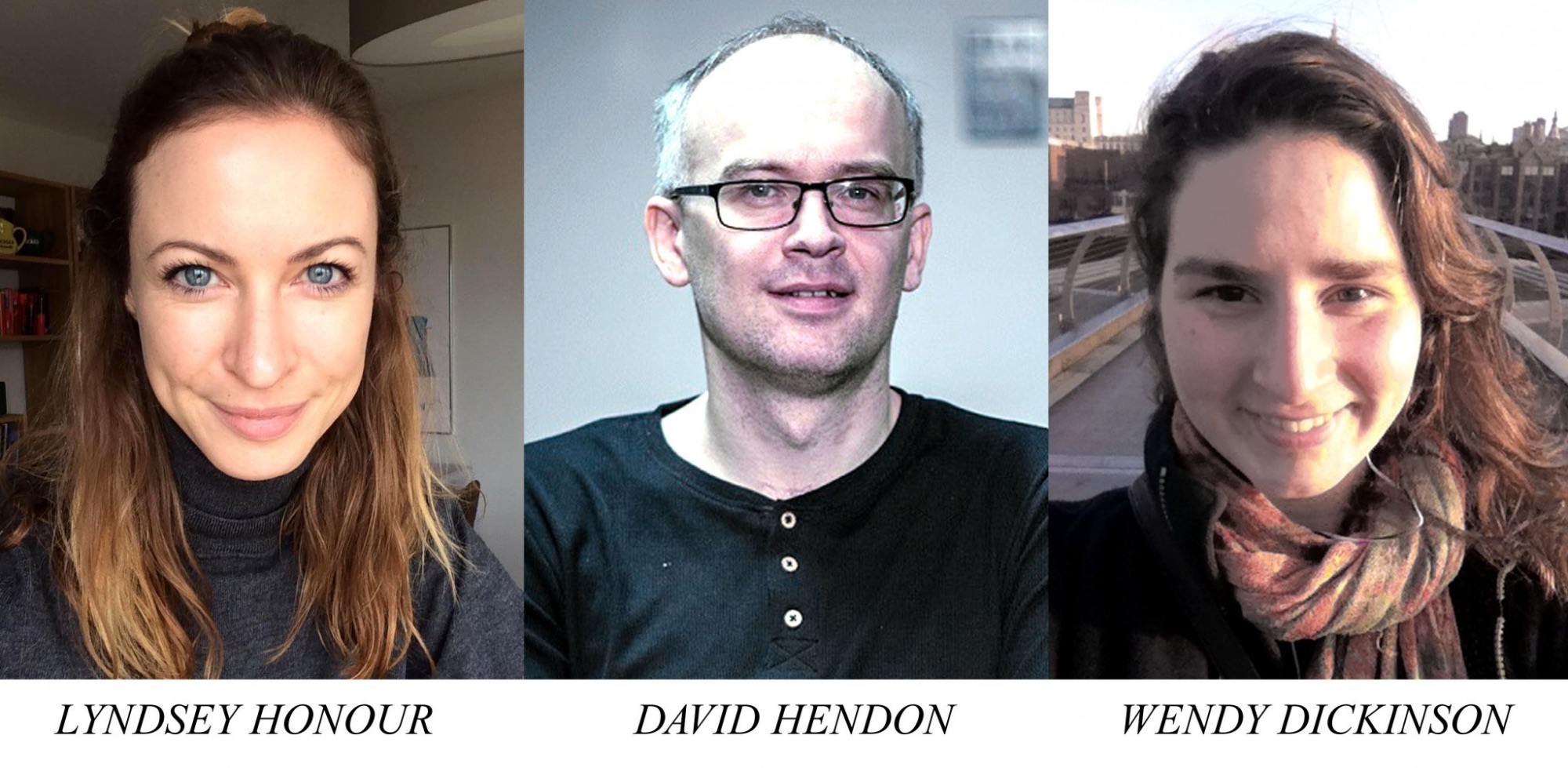
LYNDSEY HONOUR
In her day job as a TV and Film publicist, Lyndsey has had the privilege of working with a number of talented writers and she’s in awe of great storytelling. She’s also a script reader and writes whenever she gets the chance. This will be her first produced play.
“So happy to be a part of the Fringe and see my play performed.When you’re a new writer, to know someone has responded to your work means so much. Thank You !”
DAVID HENDON
David is a journalist and broadcaster based in Birmingham. Recent plays inc: The D-List, (Edinburgh Fringe 2016) Eyes to The Wind (finalist in The Kenneth Branagh Award 2016) and Sign of The Times (Ed. Fringe 2017) Short plays inc: Unfriended ( Pleasance Theatre 2016) BRAVE (Stratford East Theatre 2017) Red or Blue (Southwark Playhouse& Ed. Fringe 2017) The Woman in the Restaurant, as part of Nothing to Declare (Southwark Playhouse 2017) He also wrote The Name on The Bench as part of the Tribute Series 2017.
"I'm very proud and excited to be in the final of the Kenneth Branagh award for new drama writing. What distinguishes this competition from many other writing awards is that your play is produced, so you get to see it staged. I also like that it is judged anonymously so the only criteria is good writing. I'm looking forward to October and the performances in Windsor."
WENDY DICKINSON
Wendy is a director and composer based in the North West of England. Having composed her first musical “Knowledge by Degrees” in 2012, she has gone on to write three full length musicals, alongside a growing portfolio of commissions of chamber music, choral and orchestral work and recently made it to the final two of the 2017 International PROJECT TWO Composition competition. In addition she works as a freelance organist, violinist and accompianist.
"I am utterly delighted and honoured to be one of the finalists-it feels like a supporting boost to carry on writing. Thank you !"
Directing the Plays

Donald Sturrock directing 'Clara at Noon'
Donald grew up in England and South America. After studying Modern History at Oxford University, he joined BBC Television's Music and Arts Department where he worked as writer, producer and director, making over thirty documentaries many of which won major broadcasting awards. Since leaving the BBC, he has continued to make documentaries, while also writing and directing for the live theatre.
An avid opera fan, he has written five opera librettos. His critically acclaimed biography, Storyteller: The Life of Roald Dahl was published in 2010. His latest book Love from Boy was published in June 2016 and came out in paperback earlier this year.
Paula Chitty
Paula is a Freelance Director - Designer – Producer. She has twice, very successfully, directed plays for our Drama Award and we’re pleased to welcome her back.
She recently premiered Lily and Bear, a new musical for children at The Albert Hall (www.lilyandbearproductions.com) and recently staged opera productions at The Arcola Theatre and The Arts Theatre, West End.
She was assistant director at The Royal Opera House and now runs irrational theatre (www.irrationaltheatre.co.uk) which produces accessible, colourful, original adaptations of operas, new writing and classics.
She has directed and designed over 30 productions in London and on regional tour…. from Mike Leigh to Shakespeare and Puccini to Menotti .
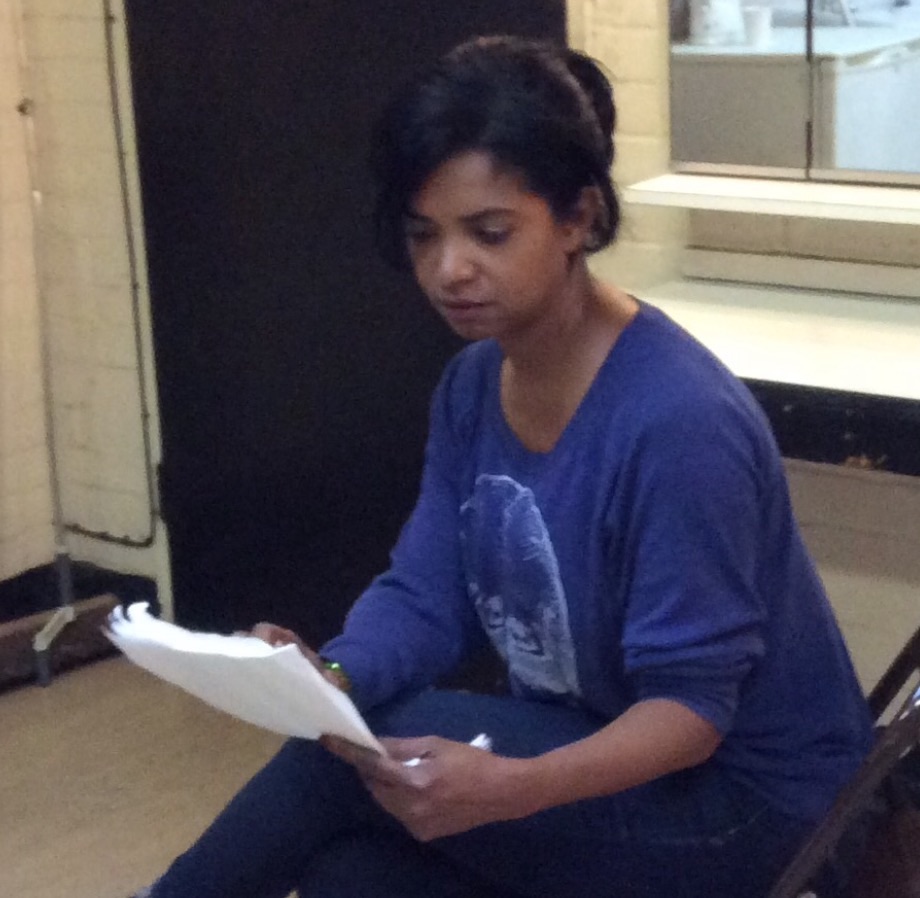
Linda Miller
Linda, originally trained as an actor at Arts Ed Drama School, as a director on Di Trevis’s, Intensive Director Training Programme and Springboard (Young Vic Theatre).
Directing credits inc: Cyrano De Bergerac (The Mill Studio, Yvonne Arnaud), The Wrong Way (Bunker Theatre), Trainspotting (Theatre 503), Beyond the Canon (Vanbrugh Theatre, ADF/ RADA), Beyond the Canon Part 2 (Cottesloe Room, National Theatre), A Harlem Story- Sequel to Porgy and Bess (Jermyn Street), Divide and Rule – ADF Talks Brexit, (National Theatre), This Man Right Here (Hen and Chickens Theatre), His Life Matters (The Bush Theatre), Selling The Sky (Furnace Residency, West Yorkshire Playhouse), Black, White, Brown and Grey (Soho Theatre Writers Avenue), Cuckoo Pint (Cockpit Theatre, Little Pieces of Gold Theatre Company), Much Ado About Nothing (Camden People's Theatre), The Build up (Southwark Theatre, LPOG), The Dead Shepherd (The White Bear Theatre), 5 Guys Chillin (Asst Dir. Otherplace, Brighton Fringe), Christmas
Asst Dir. Credits: White Bear Theatre, Spellbound Productions
Reader's Night
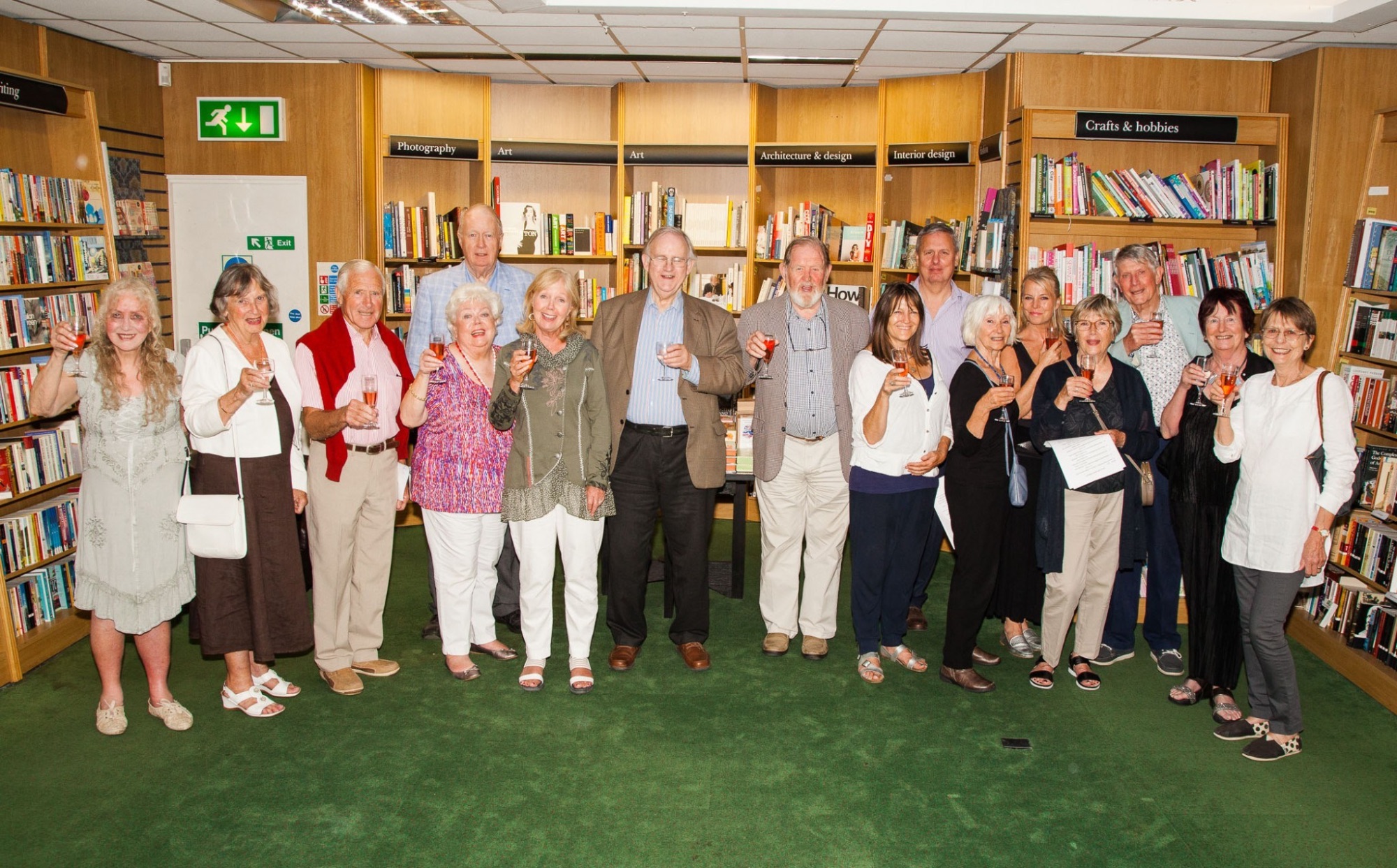
Our Judges for 2017
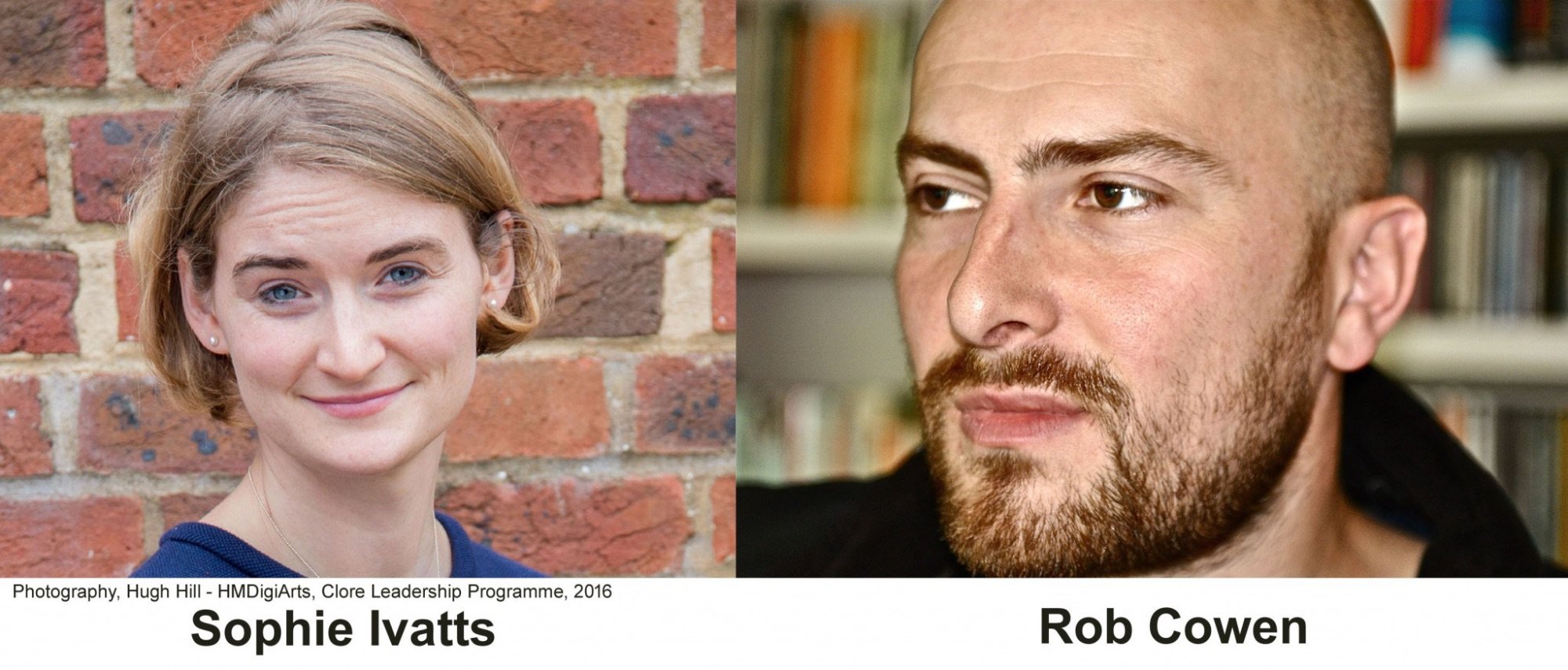
SOPHIE IVATTS
Rosemary Squire OBE, Co-Founder of the Ambassador Theatre Group, probably the world’s largest theatre group and most prolific theatre producer, now Joint CEO of Trafalgar Entertainment Group and The Windsor Fringe’s 2004 judge, has introduced young director Sophie Ivatts, her current Clore Leadership Foundation mentee , to be one of our judges this year, in order to bring a flareful artist’s sensibility and a youthful perspective to our Award.
Sophie is a freelance director and is currently undertaking a Fellowship with the Clore Leadership Programme: a year’s programme of bespoke training and development in the fields of cultural leadership.
Twitter handle: @SophieIvatts/Blog:seekingdirection.tumbit.com
Credits as director inc: I Heart London (Old Red Lion/Hen & Chickens) Live from Frome: A Verbatim Mandate for Art (Works Canteen, Frome) The Big Four Oh (Young Vic Directors) An Early Christmas Present (Old Red Lion) It Falls (Theatre 503)
Credits as assistant/associate director: A Midsummer Night’s Dream: A Play for the Nation (RSC UK Tour ) The Curious Incident of the Dog in the Night-Time (National Theatre, West End) King John (RSC) Belongings (Hampstead Theatre)
ROB COWEN
Rob is an award-winning writer and author, he has always loved drama and was a regular at West Yorkshire Playhouse growing up. His passion for drama has never diminished and he looks forward to being a judge.
In 2012 he won the Roger Deakin Award from the Society of Authors for his first book.
Skimming Stones and Other Ways of Being in the Wild. His second book, Common Ground was shortlisted for the Portico Literary Prize, Richard Jefferies Society Prize and the 2016 Wainwright Prize, as well as being selected as a ‘Book of the Year’ in the Times, Independent, Sunday Express and featured in the Guardian’s Top Ten Readers’ Choice.
He was described by the Guardian as “being one of the UK’s most exciting nature writers”
Much of Common Ground is a personal memoir but it blends many narratives, genres and perspectives, blurring the lines between novel and non-fiction.
Rob has also written screenplays and had a pilot for TV shot in 2009.
More recently he collaborated with folk musicians Nancy Kerr, Martin Simpson and Andy Cutting
to create a blend of live spoken word and folk song around Common Ground and its themes, performed at King’s Place, London.
Widely acclaimed as an important new voice, Rob has written extensively for national press, as well as writing and recording the documentary ‘The Ospreys of Loch Garten’ for the BBC.
Selection process
Scripts will be evaluated by readers and the final nine short list by our two judges. The three winning writers will be notified on June 16th 2017. Results of the competition will be announced through the media, the Windsor Fringe web//Twitter// Facebook sites and the winner of the £500 award will be announced after the last night performance.
For additional info: Tel 07858 132941 e-mail: [email protected]
OUR SCRIPTS DEADLINE HAS PASSED

Thank you to all the writers who’ve submitted their scripts.
Our Drama Script Admin. Team have been busy:
We’ve received 257 scripts from:
New Zealand, Russia, England, Malaysia, N. Ireland, Canada, Taiwan
Wales, U.S.A, Germany, Ireland, France, Scotland, Austria, Isle of Man, S. Africa and Australia.
All have been numbered, allocated to our readers for the 1st round and are being read anonymously
